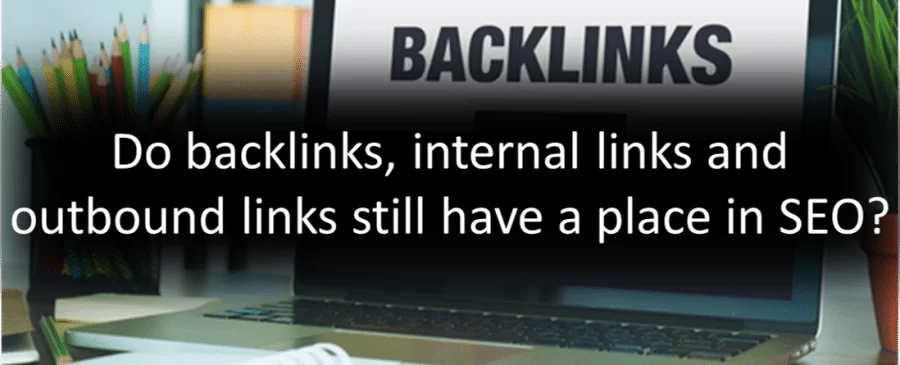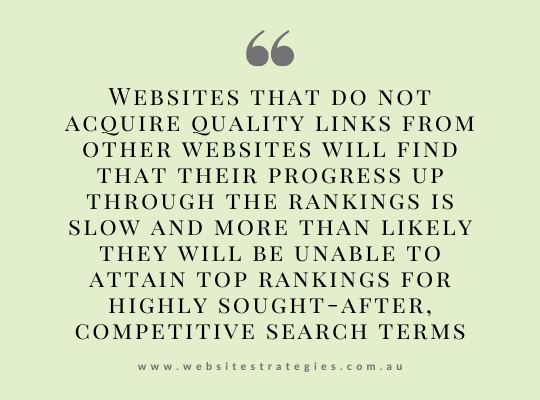Are Links Still Important For SEO?

Published On Aug 23,2022
There are many facets that make up effective SEO (Search Engine Optimisation), more than ever before. Every aspect of your website and business activity online now impacts your SEO. Without implementing best SEO practices, your business website will find itself in the search engine wilderness, the competition for space in the Google Search Results (SERPs) is just too great. In addition, it seems that all businesses nowadays are undertaking some form of SEO effort so the competition is significant.
One area of SEO that has been and still is very important, is links. These can include:
- Internal links within and between your website’s content and pages
- Links out from your website to other websites
- Links that point back to your website from other authority websites, otherwise known as backlinks.
In this article, I’m going to talk about why links are still so important for SEO, as we move into 2021 and beyond.
Why Links Are a Vital Component of Good SEO
I often get asked if link building and internal linking is still even relevant to SEO or can we attain top rankings by only developing quality content on our website. Well, the answer is that we do need top quality content and we also need to pay attention to our links.

Google still places huge emphasis on backlinks, because links that point back to your website from other websites indicate to Google that your content is valuable. In short, links are a vote of confidence in the quality of your web pages specifically and website overall.
Let’s Talk About PageRank, links and web page authority
SEO suppliers often say that PageRank is an old web page quality metric that is now no longer used by Google. But actually, it is as important a part of Google’s algorithm these days, as it always was. In simple terms what PageRank does is to allow Google to assess the importance of a web page, and this authority metric is mostly determined by the quantity and quality of the backlinks to the page. So, PageRank gives a good estimate of how valuable a web page is and the higher the PageRank the more likely that web page is to rank highly for relevant search terms. And as PageRank is based around links, then we can determine that the more links and the higher quality these links are, then the higher that page will rank.
So, how do we get backlinks to our web pages?
Ok, so we know we still need backlinks to our website. But how do we get them? Well, there are two approaches to gaining links to your website or “link building” as the SEO community calls it:
- We can develop high quality content on our own website and other websites, which naturally attracts links because our content is so good. This is known as “white hat” link building, because the method adheres to Google’s quality guidelines. (That is, we do not directly control the acquisition of links to our website, other website owners do, hence they are seen as a “vote” for our page, by Google).
- At the other end of the scale is the link building method of buying links or using automation to build links, often using low quality content. This contravenes Google’s guidelines and risks penalty. This is known, unsurprisingly, as “black hat SEO”.
These are the extremes. In between lies what some people call “grey hat SEO” which is often where the emphasis is on quality content which we then go out and deliberately link back to from other websites and platforms, such as our own social media channels. Or we build links to our web pages by placing content on other websites with our links embedded in that content.
I can tell you that apart from risking a penalty by Google and the subsequent loss of ranking, black hat SEO techniques just don’t work anymore in the long term. Google is just too sophisticated to be fooled by dodgy link building and at best will not value those links. At worse, you get a penalty and see your rankings drop or even disappear altogether.
So, with that aside let’s look at some ways we can grow quality links to our website, in as safe a way as possible.
Method 1: add linkable content to our website.
I mentioned this above, but the most natural way we can encourage people to link our web pages is to make the content on our website exemplary and very, very compelling. Calculators, online tools, survey results, tables of statistics, topical commentaries – these are all great for linking to. So, identify the content needs of your target market and fill that need. Results will follow for sure; I see it happen all the time.
Method 2: content marketing.
This is where we add high quality, unique blog posts to our website and talk about them, with links to the articles, on our social media channels such as Facebook and/or Twitter. Perhaps we create a nice graphic for our post and add that image to our own Pinterest account or Instagram. If the post was high enough quality, relevant and compelling, then other website owners may link to our post and this is a great way to grow links quite naturally. In addition, the links from the social media platforms themselves may provide some SEO value, particularly if they go “viral”.
Method 3: guest posting.
Here, I’m not talking about paying $50 for someone to post a basic 500- or 1000-word article with our link to one of their websites, from their list of hundreds or thousands of websites. I get emails from these guys every day. I’m talking about identifying a quality website that is local (ie the same country as you) and in a relevant niche, and approaching them yourself and asking if you can post a quality article to their blog. It will require some discussion usually, but ultimately, we may end up with our article on their website and with a link from the body of the article, or more likely from our bio at the bottom of the article. That’s a great link but also a great branding and exposure opportunity for you and your business. But how do you find these websites that may accept your article? Try searching for [your topic] with the words “write for us” on Google.
Method 4: local directories.
“Directory link building” in the old “spammy SEO” sense provides little SEO benefit. But being listed on local, quality business directories with a link back to your website is not only valuable for your general SEO, but essential for local SEO. Submit your website to the directories, making your presence on those high quality and professional and they can play an important part in your backlink profile.
- How to Optimize Product Images for Google Search Results [VIDEO]
- Preventing Keyword Cannibalisation: Best Practices for SEO Success
- How to Remove Yourself as a Manager of Someone Else’s Google Business Profile [VIDEO]
- [SEO Course] Introduction to Visitor Metrics and SEO
- [SEO Course] Why Monitoring Your Competitors is a Key SEO Strategy
